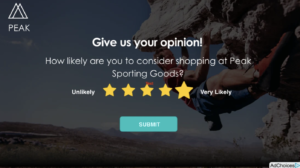ViralGains’ VoiceAlike® Adds AI to Scale Viewer Feedback
Company gauges consumer sentiment with interactive ads
ViralGains, which measures consumer sentiment by soliciting viewer reactions during commercial messages, is launching a new product that uses artificial intelligence to build and target scaled audience groups likely to have similar responses.
The new product is called VoiceAlike® and ViralGains CEO Tod Loofbourrow said it can be used to target media buys in digital display, video, connected TV and on Facebook.
“We’ve had this out there since last year [in beta tests] and we’re seeing tremendous results,” Loofbourrow said.
Last year, ViralGains launched ViralGains Odyssey™, which attaches an interactive module to its clients ads. The module poses questions to viewers about their opinions of the brand, the product and the company that ran the ad.
“What people really like is the ability to turn advertising into a conversation and actually understand how people feel about their ads, their brands, their products.” he said.
For example a consumer could be asked if they buy diapers, if they prefer the clients brand and if they don’t, what features of the product they don’t like. A consumer could be persuaded to change their mind by shifting to messaging about the brand’s eco-friendly features.
 A sample of how ViralGains sample viewers’ opinions.
A sample of how ViralGains sample viewers’ opinions.
The new product, VoiceAlike®, infers from the answers it gets how people who haven’t responded are likely to feel based on demographics and other data, creating audiences of millions of people.
“There’s about 298 variables that go into the model right now,” Loofbourrow said. VoiceAlike® then creates consumer segments that can be matched against their media preferences in order to target ads. For that diaper maker, for example, it can identify people likely to say thy prefer messages about corporate responsibility and send them relevant messages.
It can also divide those groups into confidence intervals. By focusing on consumers most likely to conform to real viewers’ responses, marketers can mount campaigns that are 2.5 to five times more effective than those relying on demographics alone.
They can also spend their budgets more wisely by suppressing low intent audiences from future campaigns or working to influence them with different creative content.
The new approach is timely as marketers are no longer able to use cookies to track consumers online.
If you want to understand where someone is with your brand, instead of following them around in a creepy way as they browse the internet, you should ask them,” Loofbourrow said. “If you really understand where someone is in the buying cycle with your brand or what they think of your brand or what things they’re interested in you can do a much better job showing them the right content.”
ViralGains works with ad agencies and directly with clients. Its largest categories include financial services, pharmaceuticals and computing. It also does a lot of business with consumer packaged goods companies and retailers.
Loofbourrow said that clients that have used ViralGains Odyssey™ are eager for ViralGains Odyssey™. “They love the power and insight they get from ViralGains Odyssey™, but being able to do it at TV scale makes it much more strategic.”
ViralGains is headquartered in Boston, with offices in Chicago, Los Angeles, San Francisco, and New York
This article originally appeared on Broadcasting & Cable.



